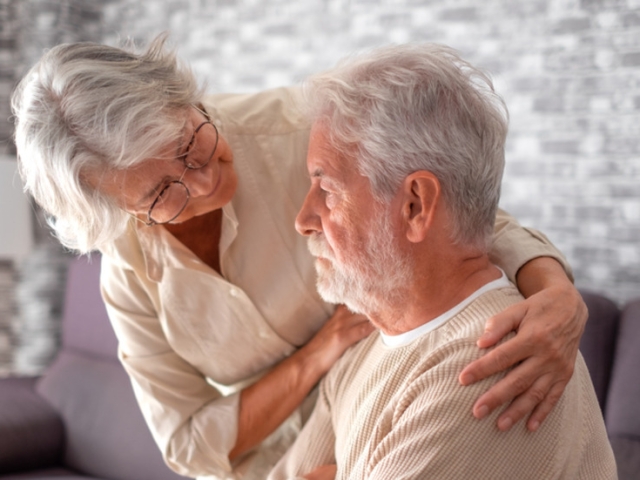
The Sexual Health of Female Partners of Prostate Cancer Survivors

Introduction
Prostate cancer can have a negative effect on a man’s sexual health, and an estimated 85% of prostate cancer survivors report sexual dysfunction in the form of erectile dysfunction (ED), changes in orgasm, anejaculation, sexual incontinence, changes in penile length or shape (including increased penile curvature), and decreased libido.
These changes can be very discouraging for prostate cancer patients, but they can also have a big impact on their sexual partners. For this reason, a recent study explored the sexual health perceptions, concerns, and needs of female partners of prostate cancer survivors through semi-structured phone interviews.
Methods
The researchers conducted phone interviews with 12 female partners of prostate cancer survivors. These participants, who were recruited from clinical locations and support groups for prostate cancer caregivers, were interviewed about their own sexual health and unmet needs, as well as their thoughts, perceptions, and concerns about their sexual health. The interviews took place between September 2021 and March 2022 and were approximately 60 minutes in duration.
Each interview was audio-recorded, transcribed verbatim, and independently coded. Then, the researchers reviewed the transcriptions and identified common themes among the interviewees.
Results
Several themes emerged from the interviews. One theme was the significant impact of prostate cancer-related sexual dysfunction on female sexual quality of life, about which one participant said:
“It has never been the same again. No matter what he’s done, he’s been unable, unless he’s using the [vacuum] pump, to get a full erection…We went a long period of time where there was actually no penetration. There was other things. There was oral sex and touching, and all of that. That’s great. But because we hadn’t done it in a while, then when we did do it, it was painful…But I was just like, wow. This is bad. It’s like if we had waited so long that it was painful for me because it’s never, ever been painful for me… I just feel like your body will change if you’re not having sex for periods, or long periods, of time.”
Another theme was the dyadic nature of sexual dysfunction and recovery, and one participant shared:
“We never used to have to schedule sex…but then you're on something [erectile dysfunction aid] that requires you to think ahead and plan for it. So, yeah, there was a lot of communication that was essential to getting through this that actually strengthened our emotional bond with each other, because prostate cancer is not just a guy's disease, it's a couple's disease.”
The participants also talked about the role of the partner in coping with and adjusting to sexual dysfunction, sharing things like:
“He did not have the urge anymore to have intercourse. So I kind of became the instigator…Our experience was, as far as we were both concerned, we were on the better end than most of them [other couples] because we still continued to have intercourse. It was still enjoyable for me. It was still enjoyable for him, even though he didn’t always reach a climax.”
Many of the participants expressed that they experienced difficulties communicating about sexual dysfunction in an intimate relationship. One participant said:
“I mean, he still has [urinary] incontinence issues and stuff and so I don't want to pressure him, but I want him to know what I have a need that's not being met… I think it's because it's such a sensitive issue and I'm afraid of coming across as like just pressuring him.”
A common complaint among the participants was a lack of physician-led sexual health counseling and support, about which one woman said:
“There is no quality of information [about sexual health]. First of all, they don't tell you, and you have no idea… The oncologist didn't give it, the urologist didn't give it, nobody gave us any of that information. We got a little bit from the urologist once we talked to him about it, but we had to bring the subject up…that disappointed me, to be honest, because I believe in freedom of information, and I'm a firm believer that unless you have facts, you're not going to be able to deal with anything…People are afraid to touch sex with a 10-foot pole, even doctors.”
Lastly, the benefit of peer interactions and proactive information seeking in addressing unmet sexual health needs emerged as a theme in this study. On this matter, a participant said:
“It's something that if women could talk to each other and know they're not alone, some of these terrible things in their relationships that you just think you can't overcome, you find new strength to be able to do it. I think a really key component in all of this is connecting with other people that are on that journey.”
Discussion & Conclusion
These findings illuminate the lived experiences of the female partners of prostate cancer survivors and their struggles with sexual health. This is important, because while partners are often equally affected by the changes in sexual health due to prostate cancer and its treatments, they may be left out of treatment discussions and the sexual recovery process. The authors concluded: “Future research and clinical efforts should continue to explore the impact of prostate cancer on partner sexual health and identify the optimal method to address unmet sexual health education and support needs among partners, such as tailored online interventions. Future efforts should also seek to connect partners with sexual health resources and promote inclusion of partners in the sexual recovery process.”
References:
- Gupta, N., Zebib, L., Wittmann, D., Nelson, C.J., Salter, C.A., Mulhall, J.P., Byrne, N., Nolasco, T.S., & Loeb, S. (2023). Understanding the sexual health perceptions, concerns, and needs of female partners of prostate cancer survivors. The Journal of Sexual Medicine, 20(5), 651-660. https://doi.org/10.1093/jsxmed/qdad027

